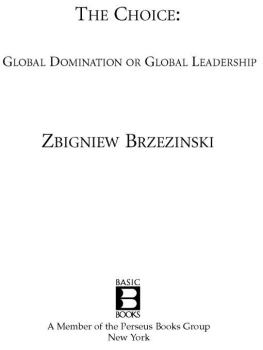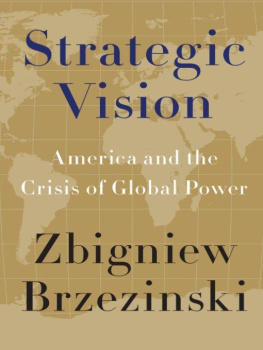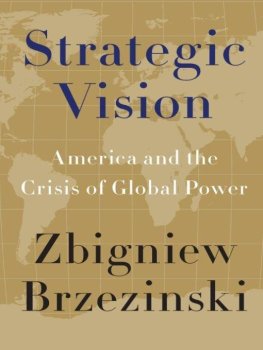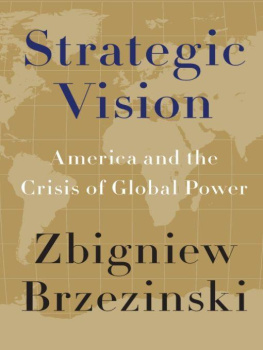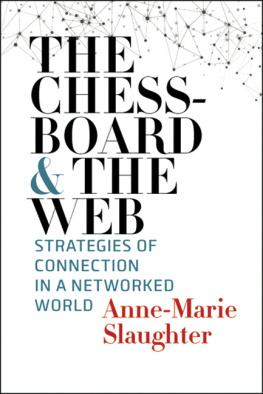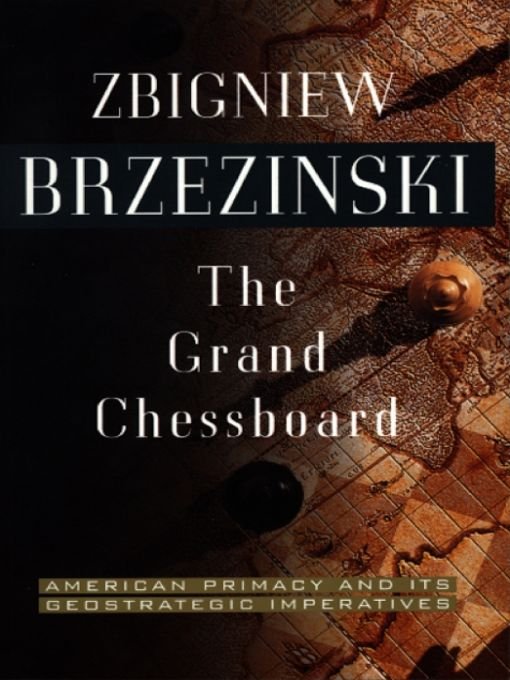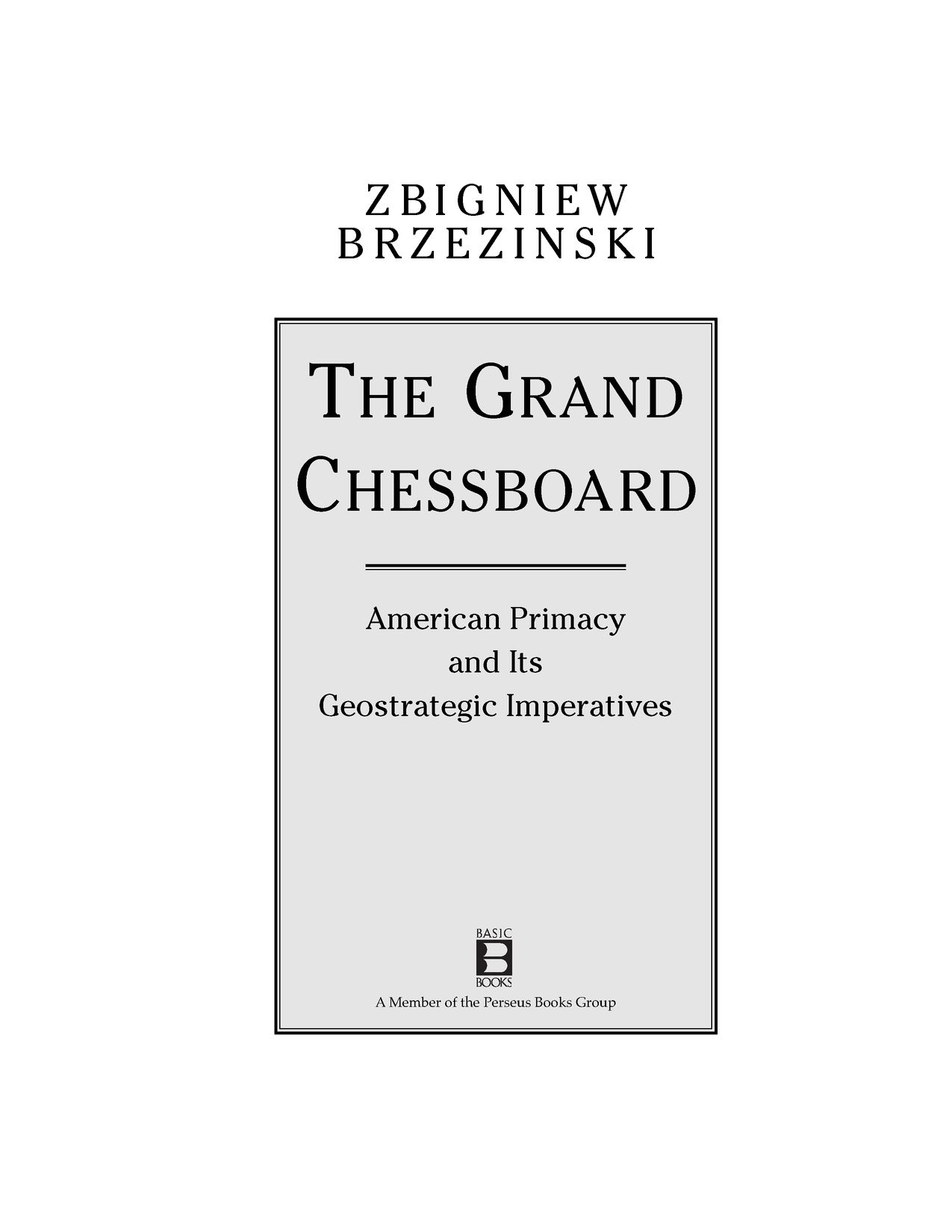Table of Contents
ALSO BY ZBIGNIEW BRZEZINSKI
Out of Control: Global Turmoil on the Eve of the Twenty-first Century (1993)
The Grand Failure: The Birth and Death of Communism in the Twentieth Century (1989)
Game Plan: A Geostrategic Framework for the Conduct of the U.S.-Soviet Contest (1986)
Power and Principle: Memoirs of the National Security Adviser, 19771981 (1983)
Between Two Ages: Americas Role in the Technetronic Era (1970)
The Soviet Bloc: Unity and Conflict (1960)
For my studentsto help them shape tomorrows world
INTRODUCTION
Superpower Politics
EVER SINCE THE CONTINENTS started interacting politically, some five hundred years ago, Eurasia has been the center of world power. In different ways, at different times, the peoples inhabiting Eurasiathough mostly those from its Western European peripherypenetrated and dominated the worlds other regions as individual Eurasian states attained the special status and enjoyed the privileges of being the worlds premier powers.
The last decade of the twentieth century has witnessed a tectonic shift in world affairs. For the first time ever, a non-Eurasian power has emerged not only as the key arbiter of Eurasian power relations but also as the worlds paramount power. The defeat and collapse of the Soviet Union was the final step in the rapid ascendance of a Western Hemisphere power, the United States, as the sole and, indeed, the first truly global power.
Eurasia, however, retains its geopolitical importance. Not only is its western peripheryEuropestill the location of much of the worlds political and economic power, but its eastern regionAsiahas lately become a vital center of economic growth and rising political influence. Hence, the issue of how a globally engaged America copes with the complex Eurasian power relationshipsand particularly whether it prevents the emergence of a dominant and antagonistic Eurasian powerremains central to Americas capacity to exercise global primacy.
It follows thatin addition to cultivating the various novel dimensions of power (technology, communications, information, as well as trade and finance)American foreign policy must remain concerned with the geopolitical dimension and must employ its influence in Eurasia in a manner that creates a stable continental equilibrium, with the United States as the political arbiter.
Eurasia is thus the chessboard on which the struggle for global primacy continues to be played, and that struggle involves geostrategythe strategic management of geopolitical interests. It is noteworthy that as recently as 1940 two aspirants to global power, Adolf Hitler and Joseph Stalin, agreed explicitly (in the secret negotiations of November of that year) that America should be excluded from Eurasia. Each realized that the injection of American power into Eurasia would preclude his ambitions regarding global domination. Each shared the assumption that Eurasia is the center of the world and that he who controls Eurasia controls the world. A half century later, the issue has been redefined: will Americas primacy in Eurasia endure, and to what ends might it be applied?
The ultimate objective of American policy should be benign and visionary: to shape a truly cooperative global community, in keeping with long-range trends and with the fundamental interests of humankind. But in the meantime, it is imperative that no Eurasian challenger emerges, capable of dominating Eurasia and thus also of challenging America. The formulation of a comprehensive and integrated Eurasian geostrategy is therefore the purpose of this book.
Zbigniew Brzezinski
Washington, D.C.
April 1997
CHAPTER 1
Hegemony of a New Type
HEGEMONY IS AS OLD AS MANKIND. But Americas current global supremacy is distinctive in the rapidity of its emergence, in its global scope, and in the manner of its exercise. In the course of a single century, America has transformed itselfand has also been transformed by international dynamicsfrom a country relatively isolated in the Western Hemisphere into a power of unprecedented worldwide reach and grasp.
THE SHORT ROAD TO GLOBAL SUPREMACY
The Spanish-American War in 1898 was Americas first overseas war of conquest. It thrust American power far into the Pacific, beyond Hawaii to the Philippines. By the turn of the century, American strategists were already busy developing doctrines for a two-ocean naval supremacy, and the American navy had begun to challenge the notion that Britain rules the waves. American claims of a special status as the sole guardian of the Western Hemispheres securityproclaimed earlier in the century by the Monroe Doctrine and subsequently justified by Americas alleged manifest destinywere even further enhanced by the construction of the Panama Canal, which facilitated naval domination over both the Atlantic and Pacific Oceans.
The basis for Americas expanding geopolitical ambitions was provided by the rapid industrialization of the countrys economy. By the outbreak of World War I, Americas growing economic might already accounted for about 33 percent of global GNP, which displaced Great Britain as the worlds leading industrial power. This remarkable economic dynamism was fostered by a culture that favored experimentation and innovation. Americas political institutions and free market economy created unprecedented opportunities for ambitious and iconoclastic inventors, who were not inhibited from pursuing their personal dreams by archaic privileges or rigid social hierarchies. In brief, national culture was uniquely congenial to economic growth, and by attracting and quickly assimilating the most talented individuals from abroad, the culture also facilitated the expansion of national power.
World War I provided the first occasion for the massive projection of American military force into Europe. A heretofore relatively isolated power promptly transported several hundred thousand of its troops across the Atlantica transoceanic military expedition unprecedented in its size and scope, which signaled the emergence of a new major player in the international arena. Just as important, the war also prompted the first major American diplomatic effort to apply American principles in seeking a solution to Europes international problems. Woodrow Wilsons famous Fourteen Points represented the injection into European geopolitics of American idealism, reinforced by American might. (A decade and a half earlier, the United States had played a leading role in settling a Far Eastern conflict between Russia and Japan, thereby also asserting its growing international stature.) The fusion of American idealism and American power thus made itself fully felt on the world scene.
Strictly speaking, however, World War I was still predominantly a European war, not a global one. But its self-destructive character marked the beginning of the end of Europes political, economic, and cultural preponderance over the rest of the world. In the course of the war, no single European power was able to prevail decisivelyand the wars outcome was heavily influenced by the entrance into the conflict of the rising non-European power, America. Thereafter, Europe would become increasingly the object, rather than the subject, of global power politics.


